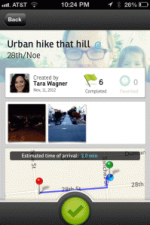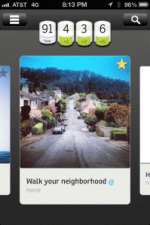
Founded in late 2011, 100Plus set out to tap into the growing popularity of the Quantified Self movement to create a personalized, mobile health prediction platform to help Average Joes like you and me stay active and get healthy. Like some of today’s better known activity and health trackers, like Fitbit, Jawbone’s Up and RunKeeper, 100Plus wants to leverage our ever-present mobile devices to create a more accessible way to analyze, understand and digest our health data — in turn, encouraging us to complete small, healthy actions, while receiving realtime feedback on how those actions affect their daily routines and long-term health.
Of course, just as we’ve heard from Tony Stubblebine and the Lift team (who have similar aspirations for their iOS app, albeit without the same health-focus) that’s easier said than done. So, rather than spending a year honing a “final product,” as the team described in a recent blog post, they decided to launch a series of “app experiments” to test their hypotheses and to learn what people really want from a health tracker.
Through these two “app experiments” (100Proof and Outside), the team learned that people are most likely to succeed in changing their lifestyle when given small, micro-goals and activities that make it easier to gain momentum and actually achieve those goals. They also want a personalized product, that’s engaging, easy to use and enables them to understand the long-term impacts of these small, daily actions on their health.
Why am I telling you this? Because of these experiments, the startup has essentially been in prolonged beta (or stealth) mode, so there hasn’t been much in the way of a public product. But, today — at great long last — that’s no longer the case. This afternoon 100Plus launched its first official iPhone app in beta (with Android set to arrive in February) that combines all the lessons learned from its app experiments into one complete experience.
Because people want concrete, diverse and personalized suggestions as to how they can add health to their day (beyond simple commands like, “hey, go to the gym, bub”) and feel good about doing it, 100Plus’ new iPhone app shows user activities created by other users, recommended based on a user’s location and preferences. The app helps users discover healthy activities that they can easily add to their day and tells them how these small, everyday behaviors — like drinking more water, taking a walk down the block — actually effect their lifespan and overall health.
The idea is to make the app the central platform for 100Plus’ future growth, as the startup is in the process of integrating with passive tracking devices (like Fitbit, Jawbone’s Up and RunKeeper, for example) to make it easier for users to get their health data into 100Plus’ system, while adding value to the user experience.
As part of the launch, 100Plus is also adding another revenue stream, going beyond being solely consumer-focused by adding a B2B2C-type distribution model, in which it plans to work with companies to distribute the app to employees for use within corporate wellness programs and, presumably, keep them happy and productive.
As to how it works? After entering basic stats on your gender, age, height, weight and where you live, users can begin discovering “Hopps,” or health opportunities, allowing them to track and get credit for taking small, health actions, which are associated with specific places and served based on GPS proximity. Once a user creates a “Hopp,” it is then blasted out to other users based on location and their preferences (i.e. nearby, home, office, activity, food and mood, for example), at which point they can complete and check-in to these actions, using a photograph (which are shared in a social feed).
Users can also form groups of friends, colleagues or based on similar interest, a la Google+, so that shares aren’t just blasted out to anyone and everyone using 100Plus.
The app also allows users to tap into large datasets from the CDC and digital health records (from Practice Fusion) to model the long-term impact of their healthy micro-behaviors. As they progress, users receive an overall health score (called LifeScore), which is modeled on the standard Life Expectancy, to show the long-term impact of those behaviors. At launch, the app has over 18K Hopps and over 7K locations in its database.
The app shares a lot in common with apps like Lift, RunKeeper, Runtastic, Beeminder and includes elements one finds in MapMyFitness apps and Foursquare, and even shares (in its plans to help people get healthier by leveraging eHealth Records) similarities with startups like Zipongo. In that sense, 100Plus is officially entering a crowded space where there’s plenty of competition.
Nonetheless, having taken the experimental, iterative approach to development, 100Plus scores high in terms of usability and design, and manages to combine some of the best aspects of similar services into a cohesive experience that has enough differentiation to warrant a test-run. What’s more, rather than being a competitor with some of these services, 100Plus sees them as potential partners and will be able to add significant value the more it adds integrations with Fitbit, Up, RunKeeper, MyFitnessPal, and so on.
What’s more, 100Plus is led by a co-founding team that has a lot of experience in the health space, with healthcare and health data specialist Chris Hogg as CEO and Ryan Howard, the Founder and CEO of free EMR service, Practice Fusion. As a result, the startup has been able to attract advisors like Klout Co-founder Binh Tran, Gretchen Wustrack (health and wellness lead at IDEO), Atlassian CMO Paul Willard and LinkedIn’s head of machine learning, Romer Rosales, to name a few.
The startup has also raised $1.25 million to date from an impressive line-up of investors, including Reid Hoffman and John Lilly (via Greylock’s Discovery Fund), Felicis Ventures, Band of Angels and Founders Fund, via Peter Thiel.
The app should go live in the App Store in the next month, but readers looking for an early test-run can sign up here and use “Techcrunch” as the beat invite code. You should then get a link to download the app shortly thereafter.




